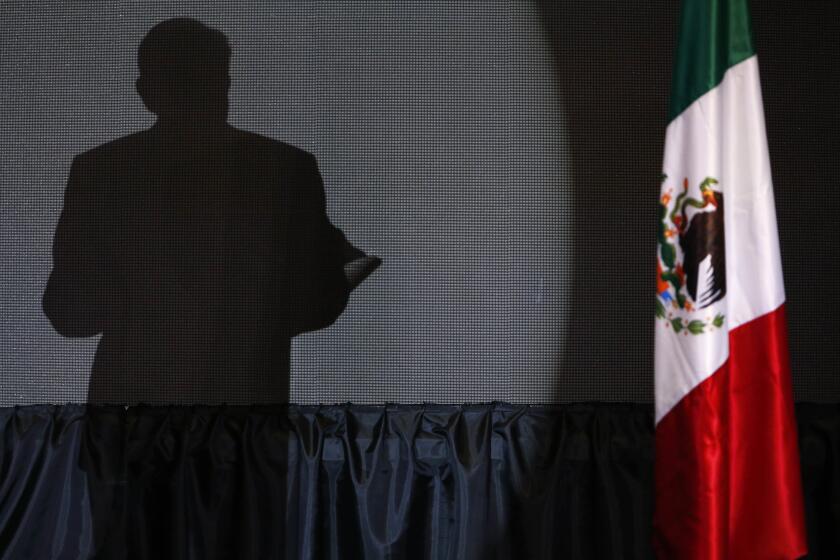British Inmates at Guantanamo to Be Released
Activists here celebrated the announcement Tuesday that the last four British prisoners being held at the U.S. Navy base in Guantanamo Bay, Cuba, would be freed, but they said they would continue to campaign on behalf of hundreds of inmates from other countries still detained without trial.
In Washington, the Pentagon announced that the four Britons and an Australian would be released from U.S. custody within weeks, based on guarantees from the British and Australian governments that their nationals would be prevented from engaging in terrorist activities.
A total of nine British nationals were held in Guantanamo after the U.S.-led invasion of Afghanistan in 2001. The other five were freed in March after human rights protests and intensive government diplomacy. Those detainees were questioned briefly by police when they were returned to Britain and then released.
“Having campaigned long and hard over Guantanamo, we are delighted that the misery of these four men and the anguish of their families at last appears to be coming to an end,” Kate Allen, director of Amnesty International for Britain, said of the four Britons whose release was announced Tuesday.
She said two foreign nationals at Guantanamo who are permanent British residents should also be freed and recalled that “more than 500 other detainees from around 40 countries remain in legal limbo.”
“People’s human rights and legal rights should not hang on whether or not they are from a country friendly to the USA,” Allen said.
“Just because you’re British doesn’t mean you’re the only people with rights,” said Clive Stafford Smith, an attorney who represented two of the British prisoners. “It’s very important that we do not forget the other lost souls in Guantanamo Bay.”
British Foreign Secretary Jack Straw announced in Parliament the decision to release the four Britons, issuing a statement free of any criticism of U.S. policy.
Although the government of Prime Minister Tony Blair has worked since 2003 to have all the British inmates at Guantanamo released to its custody, Straw said the U.S. had been reasonable to detain and question captured Taliban or Al Qaeda fighters “deemed to pose a substantial risk” of returning to violent activities.
With evidence, the released prisoners could face arrest and questioning under Britain’s Terrorist Act of 2000.
Tuesday’s announcement brought expressions of gratitude from Azmat Begg of Birmingham, England, father of the best-known British detainee awaiting release, Moazzam Begg. The elder Begg thanked the British people, constitutional and human rights lawyers and activists who kept up pressure to get the prisoners released.
The younger Begg was seized in Pakistan in early 2002 and taken to Guantanamo by way of Afghanistan, where he has alleged that he was tortured.
U.S. officials deny that they sanctioned torture. The U.S. Supreme Court in June ruled that prisoners in Guantanamo, held as enemy combatants in the war on terrorism, have the right to challenge their detention in U.S. courts. A number of such challenges are now pending.
Azmat Begg said he expected his son to require medical and psychological examination when he returned to Britain.
In addition to Moazzam Begg, the British detainees were Feroz Abbasi, 24, a Ugandan-born Muslim from south London detained in Afghanistan; Martin Mubanga, 32, a Zambian-born convert to Islam from north London arrested in Zambia; and Richard Belmar, 25, a British-born convert to Islam seized in Pakistan. All have been held for about three years.
The Australian to be freed, 48-year-old Mamdouh Habib, has filed a lawsuit against the U.S. government alleging abuse in captivity, as have four of the Britons released last year.
The Egyptian-born Habib, who holds an Australian passport and lived for many years in Sydney, was seized in Pakistan in October 2001 and was interrogated by U.S., Australian and Pakistani officials on suspicion of being an Al Qaeda agent, according to federal court papers unsealed in Washington this month.
After several weeks he was flown to Egypt, where he spent six months in Egyptian custody, his lawyers said. “The only time he left his cell was for interrogations,” Habib’s lawyers wrote, adding that interrogations lasted for hours and involved violence.
To escape the abuse, Habib admitted to a series of charges, they said. In May 2002, Habib was sent from Egypt to Guantanamo Bay, where he has been held since.
Pentagon officials said Tuesday that they could not comment on Habib’s charges. U.S. officials have not responded to his court filing, which seeks a temporary restraining order against any American attempt to return him to Egypt. A military tribunal ruled that Habib was an enemy combatant after a hearing last September.
Despite the apparent victory Tuesday, Habib’s attorney, Joseph Margulies, said he was concerned that the Defense Department did not indicate when it would transfer Habib to Australian custody.
Times staff writers Bob Drogin in Washington and Janet Stobart in London contributed to this report.
More to Read
Sign up for Essential California
The most important California stories and recommendations in your inbox every morning.
You may occasionally receive promotional content from the Los Angeles Times.










